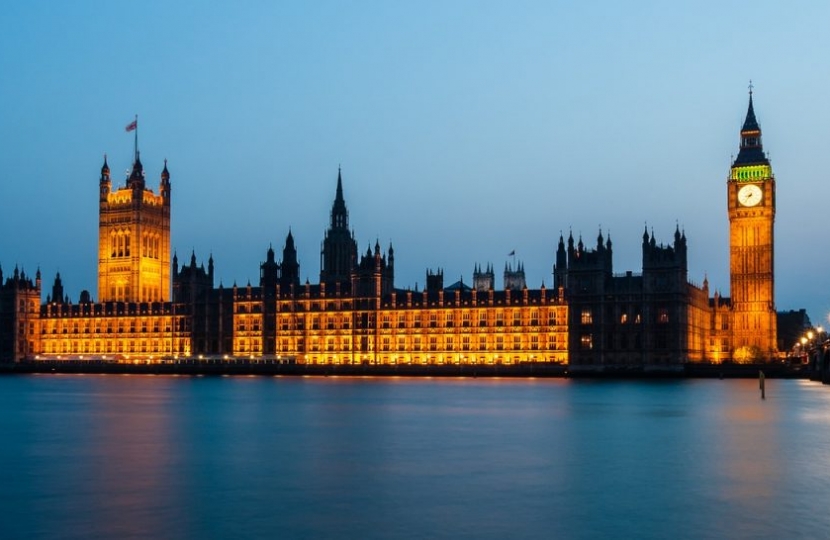
I have been contacted by constituents, asking me to explain my vote against the Labour Party’s Opposition Motion that called on the Government to continue directly funding provision of free school meals over the school holidays until Easter 2021. Many of the messages contained misunderstandings or inaccuracies that I want to dispel – for example, that the Government is “ending the free school meal programme” - I am therefore setting out my response for all those who have contacted me, so that everyone has comprehensive information. It is long, but the matter is complex and important, and I hope you will give it thought.
You may be interested to know that to date not one parent whose child receives free school meals (FSM) has been in touch with me to say they can’t make ends meet; all of the criticism appears to be from people who do not appear to be personally affected, some of whom do not understand the programme and others whose judgement has been coloured by the political assertions made by the government’s opponents.
That of course is exactly the purpose of Opposition Motions - to try to trap Conservative MPs into taking a policy position as a result of which Labour candidates at subsequent general elections can claim that their Conservative opposite number opposes something. These Motions have absolutely no legislative effect. This particular Motion was tabled by the Labour Education Spokesman who in September urged party activists “not to let a good crisis go to waste” while people are dying or being left severely incapacitated by the virus. The reality is that Labour is seeking to create political opportunity out of the pandemic by misrepresenting facts.
To set the record straight - FSM are not a general welfare measure, although entitlement to them is passported through receipt of a means-tested benefit. As set out in the Conservative Government’s Education Act 1996, they are intended to provide support during term-time periods while children are engaged in learning. That is why they are called “school meals”. The provision of a healthy school meal has been shown to help children concentrate and learn.
I unreservedly assure you that Ministers understand that the Coronavirus crisis has caused enormous disruption, and in recognition of these unprecedented and unpredictable circumstances, took the decision – amongst many others - to provide free meals to disadvantaged children during the summer holidays, through the Covid Summer Food Fund, continuing the help it had given during the summer term when the vast majority of children did not attend school.
The £120 million fund provided one-off six-week food vouchers to eligible families to use in supermarkets, and was available for all children who qualified for FSM. The Holiday Activities & Food Programme also helped up to 50,000 disadvantaged children with healthy meals, and the Breakfast Club programme was extended during the summer holidays.
The situation has changed. 99% of state schools are now open for the autumn term. FSM will of course continue to be provided in term time. Children who are eligible for FSM continue to receive them if they are required to self-isolate in term time. The Government does not however agree that FSM should be extended into forthcoming school breaks. Instead, Ministers have already put in place significant measures to support the most vulnerable families through the welfare system, rather than through schools. Unlike other parties who are focusing on FSM in isolation, the Government has taken a broad approach to supporting families.
Since March, an additional £9.3 billion has been injected into the welfare system above and beyond normal levels of support to help those who are most vulnerable. Support has been directly targeted at those on low incomes and includes:
- The standard allowance for Universal Credit increased in April by £1,000 a year. Looking at this simplistically, children have 13 weeks of holiday a year - 91 days. This increase represents an extra £11 for every single day of school holiday, weekends included;
- The basic element of Working Tax Credit has increased by £1,045 this year, benefitting more than four million households;
- The Local Housing Allowance has increased, providing £80 million for discretionary housing payments to help families with their rent;
- Payments to those who are self-employed are not currently calculated using an assumed level of earnings, called a Minimum Income Floor. Instead, they are based on actual earnings
We all know that Covid-19 and its impact on our daily lives is unpredictable. The most effective way of identifying and helping those whose circumstances make it difficult for them to manage – despite the support they receive through the benefits system – is through local authorities. £63 million of additional funding has specifically been paid to Councils for this purpose, including over the October half-term, because social workers know the families at risk in their areas and are best able to get extra help to them.
BCP Council has in total received more than £29 million from the Government, including £3.88m in recent days, on top the £395,909 received by way of the Emergency Assistance Grant for Food & Essential Supplies, all to help mitigate the impact of the pandemic on local people. As an added safety net, the Government has also provided £16 million nationally for food charities. Cumulatively, these measures have benefitted the most vulnerable and those who are on the lowest incomes.
These welfare measures sit alongside one of the most generous coronavirus support packages in the world which to date totals £200,000,000,000 including the income protection schemes such as the Coronavirus Job Retention Scheme and the Self-Employment Income Support Scheme which have collectively supported 12.2 million jobs, at a cost of almost £53 billion for England alone.
I should also explain that under current Universal Credit rules, an entitlement to FSM at first assessment remains in place even if someone’s income rises and remains above the threshold. By contrast, someone whose earnings fall must request a manual reassessment of their eligibility because the UC system does not trigger one automatically. This means that FSM is not a good mechanism to use in order to get urgent help to those most in need, particularly during a pandemic when someone’s circumstances can be impacted by ongoing events.
Some correspondents have personalised their criticism of me - “You are letting children starve whilst simultaneously granting yourself a totally unnecessary pay rise”. Not true – MPs salaries are set by the Independent Parliamentary Standards Authority, over which MPs have absolutely no control. The current IPSA proposals are subject to consultation and are based on arrangements which see Members’ pay change in-line with average rises for public sector workers as compiled by the independent Office for National Statistics. If you have an alternative view as to the manner in which IPSA should calculate MPs’ remuneration, you may wish to complete the consultation survey which has been set up to enable the public to contribute and which can be found at
https://www.smartsurvey.co.uk/s/Periodic_Adjustments_MPs_Pay_2020/
And this, “You’re letting children starve while claiming for all your own food from the taxpayer” Not true – I pledged when I first stood for election in 2010, after the expenses scandal, that I would never claim for any food, and I never have. In any event, expense claims for food are now rightly disallowed. There is also widespread misunderstanding about the catering arrangements in the House of Commons. Catering services do not provide a subsidised service in the commercial sense of the word, meaning that food and drink is not provided at a discount to pass holders, MPs included. Since 2010, food and drink prices have been regularly reviewed and set at levels benchmarked against similar London outlets outside Parliament.
I hope this covers the principal points that you believe are important, and clarifies why the Government has given money to local Councils, charities and community groups to offer help directly over this half term period.
Above all, I reiterate that NOBODY voted against helping children - we just voted to do it in a way that will reach more of those in urgent need at this uncertain and extremely difficult time for families.
